Locker Room Talk and Sexual Assault
To Whom Should I Complain?
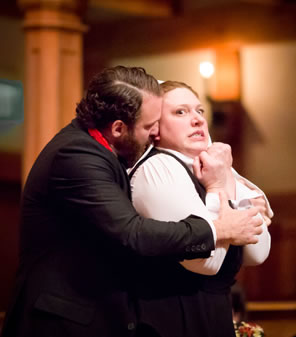
Angelo (Jonathan Holtzman) assaults Isabella (Allison Glenzer) in the Amrican Shakespeare Center's 2016 production of William Shakespeare's Measure for Measure. Photo by Lindsey Walters, American Shakespeare Center.
Rape is a key plot point in what might be the first play William Shakespeare penned. Rape is a key plot point in what probably was his last play. Across his canon, Shakespeare addresses sexual violence and abuse, even in one play conjoining that issue with the sphere of politics.
Watching the firestorm sparked by revelation of Donald Trump's “locker room talk” moment, when he bragged to host Billy Bush in an Access Hollywood video (and other interviews) how he can get away with groping women and voyeurism because he's rich, I, naturally, turned to Shakespeare for his opinion. Shakespeare might be over 400 years old, but he still is keenly tied into the zeitgeist and eerily prescient of current events. And he does have some insightful and incisive things to say about sexual assault.
Before relaying Shakespeare's opinions, I need to address my own contextual approach to politics, beauty, and locker rooms.
- Trump's comments and his bragged-about (and accused) behavior is less a political issue than a testimony of character. The politics is in the reactions and responses of politicians. You can see a demarcation between the party affiliations of men (less so among women) who generally reacted by invoking their wives and daughters and felt women should be “championed and revered” versus those who talked about women in the workplace and referred to women's rights and dignity.
- Beauty matters. Being among the nonbeautiful myself, I wish it were otherwise, but I also have to admit that I am usually swayed in my appreciation of a woman by her looks, and not just on a lust level. You will find that an actress's sex appeal shows up in many of my reviews, sometimes warranted (it's part of the portrayal), sometimes reflective (many of my reviews are self-expressions), and sometimes sexist (those I don't edit thoroughly). I'm getting better at monitoring my own sexism, even asking my wife before I write about an actress, “Was she that good or was that just my libido?” However, so much of theatrical entertainment is built around physical beauty (exhibit A: headshots), and this cuts across both genders: remove a muscular man's shirt and you sell tickets, more so than that man's exquisite verse-speaking skills or character insights. Nevertheless, even in theater as in all other workplaces and situations, talent, whether physical, intellectual, or artistic, should always trump sex appeal, which is why I'm so bothered by Trump and his supporters using physical attraction as a sole measure of a woman's credibility.
- I've been in a lot of locker rooms over the years, and I don't ever recall hearing anybody brag about groping women. At the health club I go to, the conversations in English are generally about business, biking (one of the attendants is a cycling fanatic), real estate, TV shows, and sports (those in other languages sound just as boring). Even in high school I recall most locker room talk being about an algebra test or other such impending scholastic crises. I did, however, hear “gravel pit talk,” because my friends and I found a stash of hidden Playboys out by the gravel pits: but I was 12 years old, not 59. Besides, “locker room talk” is almost always used as a derisive phrase referring to men's small-minded intellect when out of the presence of women; Trump tried to frame it as a term of legitimacy.
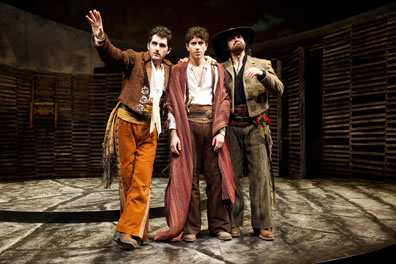
From left, Benvolio (Kevin Fugaro), Romeo (Daniel José Molina), and Mercutio (Jason Rojas) on their way to the Capulet party in the Oregoen Shakespeare Festival 2012 production of Romeo and Juliet set in California circa 1847. Photo by Jenny Graham, Oregon Shakespeare Festival.
Did Shakespeare engage in locker room talk? Some of his characters certainly did. Romeo and Juliet is full of it. It is the basis of the opening conversation between two of Capulet's servants, one of whom brags how he will be a tyrant with all of the house of Montagues: "When I have fought with the men, I will be cruel with the maids, and cut off their heads," the servant named Sampson says, graphically describing how he will shove the women against a wall and rape them. Romeo is not so graphic or violent, but he gets pretty racy revealing to Benvolio his frustration over Rosalyn refusing his sexual advances (she will not, Romeo says, "ope her lap to saint-seducing gold"). Throw Mercutio into the mix and you've got the kind of locker room that Trump and Bush would feel right at home in, from Mercutio's reference to Rosalyn's "quivering thigh and the demesnes that there adjacent lie" to Romeo's well-flowered pump. The three also verbally assault Nurse with lewd references.
These antics seldom fail to elicit laughter in modern audiences, whether it's the stage business, character gestures, or the lines themselves that elicit laughs; even Sampson's threats often get at least a chuckle. Perhaps we all have at least a bit of Bush in us.
Shakespeare doesn't necessarily cast judgments on his characters; however, his characters sometimes cast judgments on themselves and each other. Romeo moves away from the lewd talk and behavior the more he becomes committed to Juliet—the more he matures. At one key point he does bemoan how Juliet's "beauty hath made me effeminate, and in my temper soften'd valor's steel!" something he says right before he goes crazy and kills Juliet's cousin. However, beyond that one flashback to his swaggering ways—wailing afterward, "O, I am fortune's fool!"—he stays the course to be worthy of Juliet's love.
I admit the evidence of Romeo's maturity going forward is spurious: aside from his incessant whining in Friar Laurence's cell, he rashly kills Paris and himself before the play's end. However, Shakespeare's maturity in his own career is very much in evidence, especially in All's Well That Ends Well that contains the locker room scene of the French soldiers' camp outside Florence, Italy. There, two unnamed French Lords, companions to Bertram, condemn both his talk and his behavior.
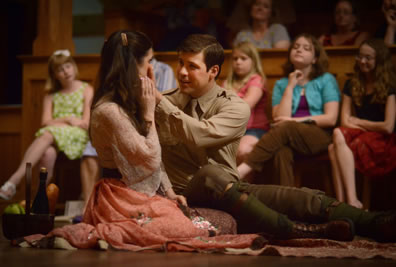
The French lord—and married—Bertram (Dylan Paul) tries to seduce Diana (Emily Brown), a local Florentine girl, in the American Shakespeare Center's 2013 production of William Shakespeare's All's Well That Ends Well at the Blackfriars Playhouse. Photo by Pat Jarrett, American Shakespeare Center.
Bertram is not as lewd as the guys of Verona, but he does apparently brag to his companions about his intents to seduce a young local woman, Diana, even though he's married (granted, married against his will). When the two lords are alone, they first decry Bertram for "shaking off so good a wife and so sweet a lady," and then the Second Lord reveals to the First Lord how Bertram has "perverted a young gentlewoman here in Florence, of a most chaste renown; and this night he fleshes his will in the spoil of her honor" (we know, however, that Bertram has not really "perverted" the gentlewoman).
In the dialogue that follows, Shakespeare uses these two men to comment on men's despicable treatment of women, a conversation applicable to Trump's boastful manner. "As we are ourselves, what things are we!" says the First Lord. "Merely our own traitors," replies the Second Lord. "And as in the common course of all treasons, we still see them reveal themselves, till they attain to their abhorred ends, so he that in this action contrives against his own nobility, in his proper stream o'erflows himself."
"Is it not meant damnable in us, to be trumpeters of our unlawful intents?" says the First Lord. Well, you would think, right? And yet, many Trump supporters, including those ascribed as government and political party leaders, do not consider such trumpeting damnable.
But a good friend of mine does consider it thus. She was a victim of the kind of sexual assault Trump himself describes doing. A lifelong Republican, my friend worries that a Trump presidency emboldens the likes of her attacker and all such men who would consider the "demesnes" under a passing woman's skirt as their own personal play space, even in a crowded public place such as the one my friend was in when she was attacked.
Attack is the accurate term. Sexual assault is what groping is. Rape is on that spectrum. And Shakespeare addresses that, too.
Back to Verona and back to one of his earliest compositions, The Two Gentlemen of Verona. One of those titular "gentlemen," Proteus (Valentine is the other) professes to be devoted to his girlfriend, Julia, in Verona. It's a level of devotion that gives him a reputation, expressed by the Duke quoting Valentine, for being "Love's firm votary and cannot soon revolt and change your mind." Put another way, nobody respects women more than he does.
However, upon arriving in Milan, Proteus immediately falls for Valentine's girlfriend, Sylvia, plots against Valentine to have him removed, and then doggedly courts Sylvia (to the level of stalking), proclaiming, even, that Julia's dead, but why cry alas? At the end of the play, after Sylvia has steadfastly refused Proteus's overtures, he tries to rape her. His justification to her is chilling, as it is so gentlemanly put: "Nay, if the gentle spirit of moving words can no way change you to a milder form, I'll woo you like a soldier, at arms' end, and love you 'gainst the nature of love … I'll force thee yield to my desire." Valentine stops Proteus and, this being a comedy, the play stumbles to a happy ending.
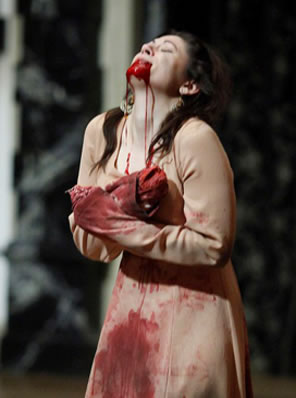
Victoria Reinsel as Lavinia in the American Shakespeare Center's 2009 production of Titus Andronicus at the Blackfriars Playhouse. Photo by Tommy Thompson, American Shakespeare Center.
However, shortly before or after writing The Two Gentlemen of Verona, Shakespeare wrote Titus Andronicus, a tragedy full of murder and mutilation with rape as a central turning point in the plot. While neither Proteus nor Valentine ever expressly use the word rape, it appears 14 times in Titus Andronicus, callously at first. Titus promises his daughter, Lavinia, as wife to the newly elected emperor, Saturninus, though she is betrothed to Saturninus's brother, Bassanio. Bassanio and Lavinia elope, whereupon Saturninus accuses his brother of raping her. "Rape, call you it, my lord, to seize my own, my truth-betrothed love and now my wife?" Bassanio replies. Saturninus is engaging in political hyperbole, but thereafter, the word rape is more often than not directly linked to the word murder.
Along with those stark references, Shakespeare graphically presents one of the most violent sexual assaults in stage history when the two sons of the Goth queen, Tamora, as part of her revenge plot against Titus, rape Lavinia and cut off her tongue and hands so she will never tell. Though the rape takes place off stage, Shakespeare maintains the violated Lavinia as a profound visual image for the rest of the play. Metaphorically, she represents the silencing of sexual assault victims, and even after the attack her person becomes a pawn in the political power struggles between the Andronici and Saturninus and his now Queen Tamora.
Tamora's role in all this should not be downplayed, either. At the point Tamora's sons are about to carry out the assault, Lavinia pleads with her to intervene, but she not only refuses, she encourages her sons to do their worst. "I will not hear her speak; away with her!" Revenge over the sacrificial killing by Titus of one her sons drives Tamora to such barbarism. Nevertheless, you don't have to look too far beneath today's headlines to find women who essentially share that reticence to condemn a sexual assault, whether driven by revenge, love, greed, or status. Some of those who high-fived Trump for his Access Hollywood boasts might even point to Lavinia's previous haughty attitude toward Tamora as some justification for her rape.
The young Shakespeare is more objective observer than judgmental playwright with Titus Andronicus. In the end almost everybody is killed—sliced, diced, baked into pies—for their sins. The more mature Shakespeare's attitude crystalizes when he takes up the topic at the end of his career with the play Cardenio, a collaboration with John Fletcher. The play has come down to us as Double Falsehood, Lewis Theobald's significant 1727 rewrite of what he claims was the original Shakespeare manuscript. How much of Double Falsehood is actually Shakespeare's or Fletcher's is an ongoing debate (my opinion, little if any is Shakespeare's or Fletcher's), but the plot is what matters here as it includes a character named Henriquez raping Violante even as he is courting his best friend's love, Leonora (the double falsehood).

Henriquez (Jonathan Horne) and Violante (Mary Russell) in Atlanta Shakspeare Tavern's 2011 production of Double Falsehood. Photo by the Atlanta Shakespeare Company.
In a soliloquy, Henriquez tries to justify his rape of Violante: "By force alone I snatch'd th' imperfect joy, which now torments my memory. Not love, but brutal violence prevail'd." He calls himself dishonorable—"shame, shame upon it!"—but then he starts the spin. "Was it a rape then? No. Her shrieks, her exclamations then had drove me from her. True, she did not consent; as true, she did resist; but still in silence all. 'Twas but the coyness of a modest bride, not the resentment of a ravisht maid" (in the endgame, Henriquez ends up marrying Violante to restore his honor). Remember, this is a character speaking, not necessarily Shakespeare or Fletcher, and not necessarily Theobald. Nevertheless, Theobald's attitude—and its stark contrast to Shakespeare's—definitely emerges in an epilogue, written by "a friend" (i.e., not Shakespeare or Fletcher) and spoken by an actress, Mrs. Oldfield:
Heaven defend us from these ancient plays,
These moral bards of good Queen Bess's days!
They write from virtue's laws, and think no further;
But draw a rape as dreadful as a murther.
You modern wits, more deeply vers'd in nature,
Can tip the wink, to tell us, you know better;
As who shou'd say, 'tis no such killing matter.
We've heard old stories told, and yet ne'er wonder'd.
Of many a prude, that has endur'd a hundred:
And Violante grieves, or we're mistaken,
Not, because ravisht, but because forsaken.
Never mind that Henriquez admits using "brutal violence" and Violante "did resist."
If nothing else, this indicates that society stepped backward in the hundred years after Shakespeare's death—and, based on some of the epilogues spoken in response to the Access Hollywood video, even further back in the ensuing 300 years. It also points to how Shakespeare and Fletcher treated rape in the original: as a true tragedy, "dreadful as murder."
Right in the middle of his career, Shakespeare makes a clear-cut case against sexual violence and abuse in Measure for Measure, throwing politics and public persona into the mix, too. This play's plot revolves around the puritanical interim governor of Vienna, Angelo, condemning Claudio to death for consensual premarital sex and then propositioning Claudio's sister, Isabella, a novice nun, as she pleads for mercy for her brother. When she refuses Angelo's sexual overtures, he dictates that he will stay her brother's execution only if she will have sex with him. As the plot unfolds, steered to a conclusion by the actual Duke of Vienna watching all while disguised as a monk, Isabella's virtue is ultimately saved and Angelo's duplicity ultimately revealed and punished in public—or nearly so, as Isabella saves his life via her own appeal to the Duke for mercy.
This all plays out without a clear moral compass, especially as the Duke is one of Shakespeare's most enigmatic heroes. Nevertheless, Shakespeare presents us with some 2016-pertinent points.
- Angelo uses the threat of reputation—his, not hers—in forcing his will upon Isabella. "Who will believe thee, Isabel?" he asks. "My unsoil'd name, the austereness of my life, my vouch against you, and my place i' the state, will so your accusation overweigh, that you shall stifle in your own report and smell of calumny." This is why Isabella—and women ever since—are so afraid to speak out about their bosses, commanders, television stars, and millionaire businessmen as it will only lead to more psychological abuse.
- Isabella does speak out. And, as Angelo promised, she is castigated. Her "smell of calumny" is worded by the Duke, no longer in disguise but still navigating his plot to ensnare Angelo (Isabella is not aware the friar she confided in was really the Duke). Though he's playing a game for her sake, what the Duke says reverberates today in the reactions toward those women who have accused Trump of sexual impropriety. "By heaven, fond wretch," the Duke says, "thou knowist not what thou speak'st, or else thou art suborn'd against his honor in hateful practice. First, his integrity stands without blemish. Next, it imports no reason that with such vehemency he should pursue faults proper to himself. … Some one hath set you on: Confess the truth, and say by whose advice thou camest here to complain."
- For more than half the play, we are presented a public persona of Angelo as so morally rigid he's described as having snow for blood. His assault on Isabella, of course, is done in private. Then, out of nowhere, we learn that he had been engaged to marry a woman named Mariana, an engagement he broke off when her dowry didn't come through. It's Angelo's dirty little secret of which the Duke is privy; yet the Duke keeps quiet until it suits his purpose to expose it.
- Angelo thinks himself a truly pious man; but he reasons against his piety when lust overtakes him. "Heaven hath my empty words; whilst my invention, hearing not my tongue, anchors on Isabel: Heaven in my mouth, as if I did but only chew his name; and in my heart the strong and swelling evil of my conception." In this meditation he makes a keen observation: "My gravity, wherein—let no man hear me—I take pride, could I with boot change for an idle plume." In this statement, revealing his pride (a sin) in his religious reputation, he's certain he can keep his private and public personas in separate chambers of reality. Of course he can't, and this is long before the era of emails.
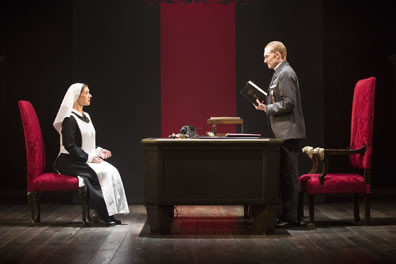
Vienna's interim governor, Angelo (Scott Parkinson, right) lays the groundwork for his sexual propisition to Isabella (Miriam Silverman) in the Shakespeare Theatre Company's 2013 production of Measure for Measure. Photo by Scott Suchman, Shakespeare Theatre Company.
Measure for Measure is a comedy, one of the funniest plays Shakespeare wrote. The main plot, however, is a tragedy, not just in subject matter but in the way Shakespeare presents it (with the apparent happy ending of Isabella and Marianna getting justice, but then the Duke himself makes a public proposal of marriage to Isabella despite her stated intent on a life of chastity). This dichotomy of genres lands the play in the made-up category of Shakespeare's "problem plays." However, the real problem is that modern audiences, including many women, have trouble accepting Isabella's own strict piety, her willingness to sacrifice her brother's life—and she does love her brother deeply—to maintain her chastity.
For Shakespeare, that is not the issue: he equates rape (and even if Isabella "consented," it's still rape by Angelo) with murder. At issue here is not Isabella's chastity but her soul, her very being, her personhood. A life is not just the physical body but also the intellect and memory. Men generally are not put in the position of such a false choice as women are—would Claudio choose castration over saving his sister's life? Yet men, over and over, in private, in workplaces, and on the political stage, divorce a woman's demesnes from her sense of humanity.
We'll let Shakespeare have the last word in this discussion, and he puts them in the mouth of Isabella. "To whom should I complain?" Isabella asks in a soliloquy after Angelo's threat. "Did I tell this, who would believe me? O perilous mouths, that bear in them one and the self-same tongue, either of condemnation or approof; bidding the law make court'sy to their will: Hooking both right and wrong to the appetite, to follow as it draws!"
Eric Minton
November 6, 2016
Comment: e-mail editorial@shakespeareances.com
Start a discussion in the Bardroom



 Find additional Shakespeareances
Find additional Shakespeareances